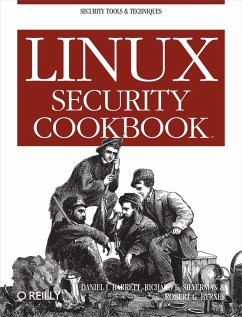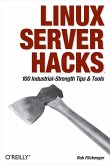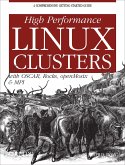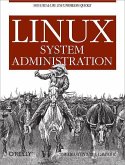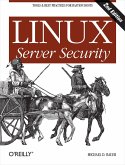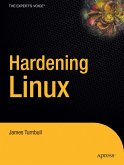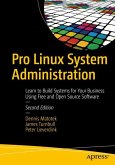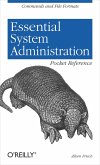- Broschiertes Buch
- Merkliste
- Auf die Merkliste
- Bewerten Bewerten
- Teilen
- Produkt teilen
- Produkterinnerung
- Produkterinnerung
Computer security is an ongoing process, a relentless contest between system administrators and intruders. A good administrator needs to stay one step ahead of any adversaries, which often involves a continuing process of education. If you're grounded in the basics of security, however, you won't necessarily want a complete treatise on the subject each time you pick up a book. Sometimes you want to get straight to the point. That's exactly what the new Linux Security Cookbook does. Rather than provide a total security solution for Linux computers, the authors present a series of easy-to-follow…mehr
Andere Kunden interessierten sich auch für
![Linux Server Hacks Linux Server Hacks]() Rob FlickengerLinux Server Hacks21,99 €
Rob FlickengerLinux Server Hacks21,99 €![High Performance Linux Clusters High Performance Linux Clusters]() Joseph D. SloanHigh Performance Linux Clusters33,99 €
Joseph D. SloanHigh Performance Linux Clusters33,99 €![Linux System Administration Linux System Administration]() Tom AdelsteinLinux System Administration37,99 €
Tom AdelsteinLinux System Administration37,99 €![Linux Server Security Linux Server Security]() Michael D. BauerLinux Server Security37,99 €
Michael D. BauerLinux Server Security37,99 €![Hardening Linux Hardening Linux]() James TurnbullHardening Linux65,99 €
James TurnbullHardening Linux65,99 €![Pro Linux System Administration Pro Linux System Administration]() Dennis MatotekPro Linux System Administration60,99 €
Dennis MatotekPro Linux System Administration60,99 €![Essential System Administration Pocket Reference Essential System Administration Pocket Reference]() Æleen FrischEssential System Administration Pocket Reference9,99 €
Æleen FrischEssential System Administration Pocket Reference9,99 €-
-
-
Computer security is an ongoing process, a relentless contest between system administrators and intruders. A good administrator needs to stay one step ahead of any adversaries, which often involves a continuing process of education. If you're grounded in the basics of security, however, you won't necessarily want a complete treatise on the subject each time you pick up a book. Sometimes you want to get straight to the point. That's exactly what the new Linux Security Cookbook does. Rather than provide a total security solution for Linux computers, the authors present a series of easy-to-follow recipes--short, focused pieces of code that administrators can use to improve security and perform common tasks securely.
The Linux Security Cookbook includes real solutions to a wide range of targeted problems, such as sending encrypted email within Emacs, restricting access to network services at particular times of day, firewalling a webserver, preventing IP spoofing, setting up key-based SSH authentication, and much more. With over 150 ready-to-use scripts and configuration files, this unique book helps administrators secure their systems without having to look up specific syntax. The book begins with recipes devised to establish a secure system, then moves on to secure day-to-day practices, and concludes with techniques to help your system stay secure. Some of the "recipes" you'll find in this book are:
* Controlling access to your system from firewalls down to individual services, using iptables, ipchains, xinetd, inetd, and more
* Monitoring your network with tcpdump, dsniff, netstat, and other tools
* Protecting network connections with Secure Shell (SSH) and stunnel
* Safeguarding email sessions with Secure Sockets Layer (SSL) * Encrypting files and email messages with GnuPG
* Probing your own security with password crackers, nmap, and handy scripts
This cookbook's proven techniques are derived from hard-won experience. Whether you're responsible for security on a home Linux system or for a large corporation, or somewhere in between, you'll find valuable, to-the-point, practical recipes for dealing with everyday security issues. This book is a system saver.
The Linux Security Cookbook includes real solutions to a wide range of targeted problems, such as sending encrypted email within Emacs, restricting access to network services at particular times of day, firewalling a webserver, preventing IP spoofing, setting up key-based SSH authentication, and much more. With over 150 ready-to-use scripts and configuration files, this unique book helps administrators secure their systems without having to look up specific syntax. The book begins with recipes devised to establish a secure system, then moves on to secure day-to-day practices, and concludes with techniques to help your system stay secure. Some of the "recipes" you'll find in this book are:
* Controlling access to your system from firewalls down to individual services, using iptables, ipchains, xinetd, inetd, and more
* Monitoring your network with tcpdump, dsniff, netstat, and other tools
* Protecting network connections with Secure Shell (SSH) and stunnel
* Safeguarding email sessions with Secure Sockets Layer (SSL) * Encrypting files and email messages with GnuPG
* Probing your own security with password crackers, nmap, and handy scripts
This cookbook's proven techniques are derived from hard-won experience. Whether you're responsible for security on a home Linux system or for a large corporation, or somewhere in between, you'll find valuable, to-the-point, practical recipes for dealing with everyday security issues. This book is a system saver.
Produktdetails
- Produktdetails
- Verlag: O'Reilly Media
- Seitenzahl: 332
- Erscheinungstermin: 8. Juli 2003
- Englisch
- Abmessung: 234mm x 177mm x 24mm
- Gewicht: 540g
- ISBN-13: 9780596003913
- ISBN-10: 0596003919
- Artikelnr.: 11247872
- Verlag: O'Reilly Media
- Seitenzahl: 332
- Erscheinungstermin: 8. Juli 2003
- Englisch
- Abmessung: 234mm x 177mm x 24mm
- Gewicht: 540g
- ISBN-13: 9780596003913
- ISBN-10: 0596003919
- Artikelnr.: 11247872
Dan Barrett has been immersed in Internet technology since 1985. Currently working as a software engineer, Dan has also been a heavy metal singer, Unix system administrator, university lecturer, web designer, and humorist. He has written several O'Reilly books, as well as monthly columns for Compute! and Keyboard Magazine. Dan and his family reside in Boston. Richard E. Silverman has a B.A. in computer science and an M.A. in pure mathematics. Richard has worked in the fields of networking, formal methods in software development, public-key infrastructure, routing security, and Unix systems administration. He is the co-author of SSH, The Secure Shell: The Definitive Guide.
Preface
A Cookbook About Security?!?
Intended Audience
Roadmap of the Book
Our Security Philosophy
Supported Linux Distributions
Trying the Recipes
Conventions Used in This Book
We'd Like to Hear from You
Acknowledgments
Chapter 1: System Snapshots with Tripwire
1.1 Setting Up Tripwire
1.2 Displaying the Policy and Configuration
1.3 Modifying the Policy and Configuration
1.4 Basic Integrity Checking
1.5 Read-Only Integrity Checking
1.6 Remote Integrity Checking
1.7 Ultra-Paranoid Integrity Checking
1.8 Expensive, Ultra-Paranoid Security Checking
1.9 Automated Integrity Checking
1.10 Printing the Latest Tripwire Report
1.11 Updating the Database
1.12 Adding Files to the Database
1.13 Excluding Files from the Database
1.14 Checking Windows VFAT Filesystems
1.15 Verifying RPM-Installed Files
1.16 Integrity Checking with rsync
1.17 Integrity Checking Manually
Chapter 2: Firewalls with iptables and ipchains
2.1 Enabling Source Address Verification
2.2 Blocking Spoofed Addresses
2.3 Blocking All Network Traffic
2.4 Blocking Incoming Traffic
2.5 Blocking Outgoing Traffic
2.6 Blocking Incoming Service Requests
2.7 Blocking Access from a Remote Host
2.8 Blocking Access to a Remote Host
2.9 Blocking Outgoing Access to All Web Servers on a Network
2.10 Blocking Remote Access, but Permitting Local
2.11 Controlling Access by MAC Address
2.12 Permitting SSH Access Only
2.13 Prohibiting Outgoing Telnet Connections
2.14 Protecting a Dedicated Server
2.15 Preventing pings
2.16 Listing Your Firewall Rules
2.17 Deleting Firewall Rules
2.18 Inserting Firewall Rules
2.19 Saving a Firewall Configuration
2.20 Loading a Firewall Configuration
2.21 Testing a Firewall Configuration
2.22 Building Complex Rule Trees
2.23 Logging Simplified
Chapter 3: Network Access Control
3.1 Listing Your Network Interfaces
3.2 Starting and Stopping the Network Interface
3.3 Enabling/Disabling a Service (xinetd)
3.4 Enabling/Disabling a Service (inetd)
3.5 Adding a New Service (xinetd)
3.6 Adding a New Service (inetd)
3.7 Restricting Access by Remote Users
3.8 Restricting Access by Remote Hosts (xinetd)
3.9 Restricting Access by Remote Hosts (xinetd with libwrap)
3.10 Restricting Access by Remote Hosts (xinetd with tcpd)
3.11 Restricting Access by Remote Hosts (inetd)
3.12 Restricting Access by Time of Day
3.13 Restricting Access to an SSH Server by Host
3.14 Restricting Access to an SSH Server by Account
3.15 Restricting Services to Specific Filesystem Directories
3.16 Preventing Denial of Service Attacks
3.17 Redirecting to Another Socket
3.18 Logging Access to Your Services
3.19 Prohibiting root Logins on Terminal Devices
Chapter 4: Authentication Techniques and Infrastructures
4.1 Creating a PAM-Aware Application
4.2 Enforcing Password Strength with PAM
4.3 Creating Access Control Lists with PAM
4.4 Validating an SSL Certificate
4.5 Decoding an SSL Certificate
4.6 Installing a New SSL Certificate
4.7 Generating an SSL Certificate Signing Request (CSR)
4.8 Creating a Self-Signed SSL Certificate
4.9 Setting Up a Certifying Authority
4.10 Converting SSL Certificates from DER to PEM
4.11 Getting Started with Kerberos
4.12 Adding Users to a Kerberos Realm
4.13 Adding Hosts to a Kerberos Realm
4.14 Using Kerberos with SSH
4.15 Using Kerberos with Telnet
4.16 Securing IMAP with Kerberos
4.17 Using Kerberos with PAM for System-Wide Authentication
Chapter 5: Authorization Controls
5.1 Running a root Login Shell
5.2 Running X Programs as root
5.3 Running Commands as Another User via sudo
5.4 Bypassing Password Authentication in sudo
5.5 Forcing Password Authentication in sudo
5.6 Authorizing per Host in sudo
5.7 Granting Privileges to a Group via sudo
5.8 Running Any Program in a Directory via sudo
5.9 Prohibiting Command Arguments with sudo
5.10 Sharing Files Using Groups
5.11 Permitting Read-Only Access to a Shared File via sudo
5.12 Authorizing Password Changes via sudo
5.13 Starting/Stopping Daemons via sudo
5.14 Restricting root's Abilities via sudo
5.15 Killing Processes via sudo
5.16 Listing sudo Invocations
5.17 Logging sudo Remotely
5.18 Sharing root Privileges via SSH
5.19 Running root Commands via SSH
5.20 Sharing root Privileges via Kerberos su
Chapter 6: Protecting Outgoing Network Connections
6.1 Logging into a Remote Host
6.2 Invoking Remote Programs
6.3 Copying Files Remotely
6.4 Authenticating by Public Key (OpenSSH)
6.5 Authenticating by Public Key (OpenSSH Client, SSH2 Server, OpenSSH Key)
6.6 Authenticating by Public Key (OpenSSH Client, SSH2 Server, SSH2 Key)
6.7 Authenticating by Public Key (SSH2 Client, OpenSSH Server)
6.8 Authenticating by Trusted Host
6.9 Authenticating Without a Password (Interactively)
6.10 Authenticating in cron Jobs
6.11 Terminating an SSH Agent on Logout
6.12 Tailoring SSH per Host
6.13 Changing SSH Client Defaults
6.14 Tunneling Another TCP Session Through SSH
6.15 Keeping Track of Passwords
Chapter 7: Protecting Files
7.1 Using File Permissions
7.2 Securing a Shared Directory
7.3 Prohibiting Directory Listings
7.4 Encrypting Files with a Password
7.5 Decrypting Files
7.6 Setting Up GnuPG for Public-Key Encryption
7.7 Listing Your Keyring
7.8 Setting a Default Key
7.9 Sharing Public Keys
7.10 Adding Keys to Your Keyring
7.11 Encrypting Files for Others
7.12 Signing a Text File
7.13 Signing and Encrypting Files
7.14 Creating a Detached Signature File
7.15 Checking a Signature
7.16 Printing Public Keys
7.17 Backing Up a Private Key
7.18 Encrypting Directories
7.19 Adding Your Key to a Keyserver
7.20 Uploading New Signatures to a Keyserver
7.21 Obtaining Keys from a Keyserver
7.22 Revoking a Key
7.23 Maintaining Encrypted Files with Emacs
7.24 Maintaining Encrypted Files with vim
7.25 Encrypting Backups
7.26 Using PGP Keys with GnuPG
Chapter 8: Protecting Email
8.1 Encrypted Mail with Emacs
8.2 Encrypted Mail with vim
8.3 Encrypted Mail with Pine
8.4 Encrypted Mail with Mozilla
8.5 Encrypted Mail with Evolution
8.6 Encrypted Mail with mutt
8.7 Encrypted Mail with elm
8.8 Encrypted Mail with MH
8.9 Running a POP/IMAP Mail Server with SSL
8.10 Testing an SSL Mail Connection
8.11 Securing POP/IMAP with SSL and Pine
8.12 Securing POP/IMAP with SSL and mutt
8.13 Securing POP/IMAP with SSL and Evolution
8.14 Securing POP/IMAP with stunnel and SSL
8.15 Securing POP/IMAP with SSH
8.16 Securing POP/IMAP with SSH and Pine
8.17 Receiving Mail Without a Visible Server
8.18 Using an SMTP Server from Arbitrary Clients
Chapter 9: Testing and Monitoring
9.1 Testing Login Passwords (John the Ripper)
9.2 Testing Login Passwords (CrackLib)
9.3 Finding Accounts with No Password
9.4 Finding Superuser Accounts
9.5 Checking for Suspicious Account Use
9.6 Checking for Suspicious Account Use, Multiple Systems
9.7 Testing Your Search Path
9.8 Searching Filesystems Effectively
9.9 Finding setuid (or setgid) Programs
9.10 Securing Device Special Files
9.11 Finding Writable Files
9.12 Looking for Rootkits
9.13 Testing for Open Ports
9.14 Examining Local Network Activities
9.15 Tracing Processes
9.16 Observing Network Traffic
9.17 Observing Network Traffic (GUI)
9.18 Searching for Strings in Network Traffic
9.19 Detecting Insecure Network Protocols
9.20 Getting Started with Snort
9.21 Packet Sniffing with Snort
9.22 Detecting Intrusions with Snort
9.23 Decoding Snort Alert Messages
9.24 Logging with Snort
9.25 Partitioning Snort Logs Into Separate Files
9.26 Upgrading and Tuning Snort's Ruleset
9.27 Directing System Messages to Log Files (syslog)
9.28 Testing a syslog Configuration
9.29 Logging Remotely
9.30 Rotating Log Files
9.31 Sending Messages to the System Logger
9.32 Writing Log Entries via Shell Scripts
9.33 Writing Log Entries via Perl
9.34 Writing Log Entries via C
9.35 Combining Log Files
9.36 Summarizing Your Logs with logwatch
9.37 Defining a logwatch Filter
9.38 Monitoring All Executed Commands
9.39 Displaying All Executed Commands
9.40 Parsing the Process Accounting Log
9.41 Recovering from a Hack
9.42 Filing an Incident Report
Colophon
A Cookbook About Security?!?
Intended Audience
Roadmap of the Book
Our Security Philosophy
Supported Linux Distributions
Trying the Recipes
Conventions Used in This Book
We'd Like to Hear from You
Acknowledgments
Chapter 1: System Snapshots with Tripwire
1.1 Setting Up Tripwire
1.2 Displaying the Policy and Configuration
1.3 Modifying the Policy and Configuration
1.4 Basic Integrity Checking
1.5 Read-Only Integrity Checking
1.6 Remote Integrity Checking
1.7 Ultra-Paranoid Integrity Checking
1.8 Expensive, Ultra-Paranoid Security Checking
1.9 Automated Integrity Checking
1.10 Printing the Latest Tripwire Report
1.11 Updating the Database
1.12 Adding Files to the Database
1.13 Excluding Files from the Database
1.14 Checking Windows VFAT Filesystems
1.15 Verifying RPM-Installed Files
1.16 Integrity Checking with rsync
1.17 Integrity Checking Manually
Chapter 2: Firewalls with iptables and ipchains
2.1 Enabling Source Address Verification
2.2 Blocking Spoofed Addresses
2.3 Blocking All Network Traffic
2.4 Blocking Incoming Traffic
2.5 Blocking Outgoing Traffic
2.6 Blocking Incoming Service Requests
2.7 Blocking Access from a Remote Host
2.8 Blocking Access to a Remote Host
2.9 Blocking Outgoing Access to All Web Servers on a Network
2.10 Blocking Remote Access, but Permitting Local
2.11 Controlling Access by MAC Address
2.12 Permitting SSH Access Only
2.13 Prohibiting Outgoing Telnet Connections
2.14 Protecting a Dedicated Server
2.15 Preventing pings
2.16 Listing Your Firewall Rules
2.17 Deleting Firewall Rules
2.18 Inserting Firewall Rules
2.19 Saving a Firewall Configuration
2.20 Loading a Firewall Configuration
2.21 Testing a Firewall Configuration
2.22 Building Complex Rule Trees
2.23 Logging Simplified
Chapter 3: Network Access Control
3.1 Listing Your Network Interfaces
3.2 Starting and Stopping the Network Interface
3.3 Enabling/Disabling a Service (xinetd)
3.4 Enabling/Disabling a Service (inetd)
3.5 Adding a New Service (xinetd)
3.6 Adding a New Service (inetd)
3.7 Restricting Access by Remote Users
3.8 Restricting Access by Remote Hosts (xinetd)
3.9 Restricting Access by Remote Hosts (xinetd with libwrap)
3.10 Restricting Access by Remote Hosts (xinetd with tcpd)
3.11 Restricting Access by Remote Hosts (inetd)
3.12 Restricting Access by Time of Day
3.13 Restricting Access to an SSH Server by Host
3.14 Restricting Access to an SSH Server by Account
3.15 Restricting Services to Specific Filesystem Directories
3.16 Preventing Denial of Service Attacks
3.17 Redirecting to Another Socket
3.18 Logging Access to Your Services
3.19 Prohibiting root Logins on Terminal Devices
Chapter 4: Authentication Techniques and Infrastructures
4.1 Creating a PAM-Aware Application
4.2 Enforcing Password Strength with PAM
4.3 Creating Access Control Lists with PAM
4.4 Validating an SSL Certificate
4.5 Decoding an SSL Certificate
4.6 Installing a New SSL Certificate
4.7 Generating an SSL Certificate Signing Request (CSR)
4.8 Creating a Self-Signed SSL Certificate
4.9 Setting Up a Certifying Authority
4.10 Converting SSL Certificates from DER to PEM
4.11 Getting Started with Kerberos
4.12 Adding Users to a Kerberos Realm
4.13 Adding Hosts to a Kerberos Realm
4.14 Using Kerberos with SSH
4.15 Using Kerberos with Telnet
4.16 Securing IMAP with Kerberos
4.17 Using Kerberos with PAM for System-Wide Authentication
Chapter 5: Authorization Controls
5.1 Running a root Login Shell
5.2 Running X Programs as root
5.3 Running Commands as Another User via sudo
5.4 Bypassing Password Authentication in sudo
5.5 Forcing Password Authentication in sudo
5.6 Authorizing per Host in sudo
5.7 Granting Privileges to a Group via sudo
5.8 Running Any Program in a Directory via sudo
5.9 Prohibiting Command Arguments with sudo
5.10 Sharing Files Using Groups
5.11 Permitting Read-Only Access to a Shared File via sudo
5.12 Authorizing Password Changes via sudo
5.13 Starting/Stopping Daemons via sudo
5.14 Restricting root's Abilities via sudo
5.15 Killing Processes via sudo
5.16 Listing sudo Invocations
5.17 Logging sudo Remotely
5.18 Sharing root Privileges via SSH
5.19 Running root Commands via SSH
5.20 Sharing root Privileges via Kerberos su
Chapter 6: Protecting Outgoing Network Connections
6.1 Logging into a Remote Host
6.2 Invoking Remote Programs
6.3 Copying Files Remotely
6.4 Authenticating by Public Key (OpenSSH)
6.5 Authenticating by Public Key (OpenSSH Client, SSH2 Server, OpenSSH Key)
6.6 Authenticating by Public Key (OpenSSH Client, SSH2 Server, SSH2 Key)
6.7 Authenticating by Public Key (SSH2 Client, OpenSSH Server)
6.8 Authenticating by Trusted Host
6.9 Authenticating Without a Password (Interactively)
6.10 Authenticating in cron Jobs
6.11 Terminating an SSH Agent on Logout
6.12 Tailoring SSH per Host
6.13 Changing SSH Client Defaults
6.14 Tunneling Another TCP Session Through SSH
6.15 Keeping Track of Passwords
Chapter 7: Protecting Files
7.1 Using File Permissions
7.2 Securing a Shared Directory
7.3 Prohibiting Directory Listings
7.4 Encrypting Files with a Password
7.5 Decrypting Files
7.6 Setting Up GnuPG for Public-Key Encryption
7.7 Listing Your Keyring
7.8 Setting a Default Key
7.9 Sharing Public Keys
7.10 Adding Keys to Your Keyring
7.11 Encrypting Files for Others
7.12 Signing a Text File
7.13 Signing and Encrypting Files
7.14 Creating a Detached Signature File
7.15 Checking a Signature
7.16 Printing Public Keys
7.17 Backing Up a Private Key
7.18 Encrypting Directories
7.19 Adding Your Key to a Keyserver
7.20 Uploading New Signatures to a Keyserver
7.21 Obtaining Keys from a Keyserver
7.22 Revoking a Key
7.23 Maintaining Encrypted Files with Emacs
7.24 Maintaining Encrypted Files with vim
7.25 Encrypting Backups
7.26 Using PGP Keys with GnuPG
Chapter 8: Protecting Email
8.1 Encrypted Mail with Emacs
8.2 Encrypted Mail with vim
8.3 Encrypted Mail with Pine
8.4 Encrypted Mail with Mozilla
8.5 Encrypted Mail with Evolution
8.6 Encrypted Mail with mutt
8.7 Encrypted Mail with elm
8.8 Encrypted Mail with MH
8.9 Running a POP/IMAP Mail Server with SSL
8.10 Testing an SSL Mail Connection
8.11 Securing POP/IMAP with SSL and Pine
8.12 Securing POP/IMAP with SSL and mutt
8.13 Securing POP/IMAP with SSL and Evolution
8.14 Securing POP/IMAP with stunnel and SSL
8.15 Securing POP/IMAP with SSH
8.16 Securing POP/IMAP with SSH and Pine
8.17 Receiving Mail Without a Visible Server
8.18 Using an SMTP Server from Arbitrary Clients
Chapter 9: Testing and Monitoring
9.1 Testing Login Passwords (John the Ripper)
9.2 Testing Login Passwords (CrackLib)
9.3 Finding Accounts with No Password
9.4 Finding Superuser Accounts
9.5 Checking for Suspicious Account Use
9.6 Checking for Suspicious Account Use, Multiple Systems
9.7 Testing Your Search Path
9.8 Searching Filesystems Effectively
9.9 Finding setuid (or setgid) Programs
9.10 Securing Device Special Files
9.11 Finding Writable Files
9.12 Looking for Rootkits
9.13 Testing for Open Ports
9.14 Examining Local Network Activities
9.15 Tracing Processes
9.16 Observing Network Traffic
9.17 Observing Network Traffic (GUI)
9.18 Searching for Strings in Network Traffic
9.19 Detecting Insecure Network Protocols
9.20 Getting Started with Snort
9.21 Packet Sniffing with Snort
9.22 Detecting Intrusions with Snort
9.23 Decoding Snort Alert Messages
9.24 Logging with Snort
9.25 Partitioning Snort Logs Into Separate Files
9.26 Upgrading and Tuning Snort's Ruleset
9.27 Directing System Messages to Log Files (syslog)
9.28 Testing a syslog Configuration
9.29 Logging Remotely
9.30 Rotating Log Files
9.31 Sending Messages to the System Logger
9.32 Writing Log Entries via Shell Scripts
9.33 Writing Log Entries via Perl
9.34 Writing Log Entries via C
9.35 Combining Log Files
9.36 Summarizing Your Logs with logwatch
9.37 Defining a logwatch Filter
9.38 Monitoring All Executed Commands
9.39 Displaying All Executed Commands
9.40 Parsing the Process Accounting Log
9.41 Recovering from a Hack
9.42 Filing an Incident Report
Colophon
Preface
A Cookbook About Security?!?
Intended Audience
Roadmap of the Book
Our Security Philosophy
Supported Linux Distributions
Trying the Recipes
Conventions Used in This Book
We'd Like to Hear from You
Acknowledgments
Chapter 1: System Snapshots with Tripwire
1.1 Setting Up Tripwire
1.2 Displaying the Policy and Configuration
1.3 Modifying the Policy and Configuration
1.4 Basic Integrity Checking
1.5 Read-Only Integrity Checking
1.6 Remote Integrity Checking
1.7 Ultra-Paranoid Integrity Checking
1.8 Expensive, Ultra-Paranoid Security Checking
1.9 Automated Integrity Checking
1.10 Printing the Latest Tripwire Report
1.11 Updating the Database
1.12 Adding Files to the Database
1.13 Excluding Files from the Database
1.14 Checking Windows VFAT Filesystems
1.15 Verifying RPM-Installed Files
1.16 Integrity Checking with rsync
1.17 Integrity Checking Manually
Chapter 2: Firewalls with iptables and ipchains
2.1 Enabling Source Address Verification
2.2 Blocking Spoofed Addresses
2.3 Blocking All Network Traffic
2.4 Blocking Incoming Traffic
2.5 Blocking Outgoing Traffic
2.6 Blocking Incoming Service Requests
2.7 Blocking Access from a Remote Host
2.8 Blocking Access to a Remote Host
2.9 Blocking Outgoing Access to All Web Servers on a Network
2.10 Blocking Remote Access, but Permitting Local
2.11 Controlling Access by MAC Address
2.12 Permitting SSH Access Only
2.13 Prohibiting Outgoing Telnet Connections
2.14 Protecting a Dedicated Server
2.15 Preventing pings
2.16 Listing Your Firewall Rules
2.17 Deleting Firewall Rules
2.18 Inserting Firewall Rules
2.19 Saving a Firewall Configuration
2.20 Loading a Firewall Configuration
2.21 Testing a Firewall Configuration
2.22 Building Complex Rule Trees
2.23 Logging Simplified
Chapter 3: Network Access Control
3.1 Listing Your Network Interfaces
3.2 Starting and Stopping the Network Interface
3.3 Enabling/Disabling a Service (xinetd)
3.4 Enabling/Disabling a Service (inetd)
3.5 Adding a New Service (xinetd)
3.6 Adding a New Service (inetd)
3.7 Restricting Access by Remote Users
3.8 Restricting Access by Remote Hosts (xinetd)
3.9 Restricting Access by Remote Hosts (xinetd with libwrap)
3.10 Restricting Access by Remote Hosts (xinetd with tcpd)
3.11 Restricting Access by Remote Hosts (inetd)
3.12 Restricting Access by Time of Day
3.13 Restricting Access to an SSH Server by Host
3.14 Restricting Access to an SSH Server by Account
3.15 Restricting Services to Specific Filesystem Directories
3.16 Preventing Denial of Service Attacks
3.17 Redirecting to Another Socket
3.18 Logging Access to Your Services
3.19 Prohibiting root Logins on Terminal Devices
Chapter 4: Authentication Techniques and Infrastructures
4.1 Creating a PAM-Aware Application
4.2 Enforcing Password Strength with PAM
4.3 Creating Access Control Lists with PAM
4.4 Validating an SSL Certificate
4.5 Decoding an SSL Certificate
4.6 Installing a New SSL Certificate
4.7 Generating an SSL Certificate Signing Request (CSR)
4.8 Creating a Self-Signed SSL Certificate
4.9 Setting Up a Certifying Authority
4.10 Converting SSL Certificates from DER to PEM
4.11 Getting Started with Kerberos
4.12 Adding Users to a Kerberos Realm
4.13 Adding Hosts to a Kerberos Realm
4.14 Using Kerberos with SSH
4.15 Using Kerberos with Telnet
4.16 Securing IMAP with Kerberos
4.17 Using Kerberos with PAM for System-Wide Authentication
Chapter 5: Authorization Controls
5.1 Running a root Login Shell
5.2 Running X Programs as root
5.3 Running Commands as Another User via sudo
5.4 Bypassing Password Authentication in sudo
5.5 Forcing Password Authentication in sudo
5.6 Authorizing per Host in sudo
5.7 Granting Privileges to a Group via sudo
5.8 Running Any Program in a Directory via sudo
5.9 Prohibiting Command Arguments with sudo
5.10 Sharing Files Using Groups
5.11 Permitting Read-Only Access to a Shared File via sudo
5.12 Authorizing Password Changes via sudo
5.13 Starting/Stopping Daemons via sudo
5.14 Restricting root's Abilities via sudo
5.15 Killing Processes via sudo
5.16 Listing sudo Invocations
5.17 Logging sudo Remotely
5.18 Sharing root Privileges via SSH
5.19 Running root Commands via SSH
5.20 Sharing root Privileges via Kerberos su
Chapter 6: Protecting Outgoing Network Connections
6.1 Logging into a Remote Host
6.2 Invoking Remote Programs
6.3 Copying Files Remotely
6.4 Authenticating by Public Key (OpenSSH)
6.5 Authenticating by Public Key (OpenSSH Client, SSH2 Server, OpenSSH Key)
6.6 Authenticating by Public Key (OpenSSH Client, SSH2 Server, SSH2 Key)
6.7 Authenticating by Public Key (SSH2 Client, OpenSSH Server)
6.8 Authenticating by Trusted Host
6.9 Authenticating Without a Password (Interactively)
6.10 Authenticating in cron Jobs
6.11 Terminating an SSH Agent on Logout
6.12 Tailoring SSH per Host
6.13 Changing SSH Client Defaults
6.14 Tunneling Another TCP Session Through SSH
6.15 Keeping Track of Passwords
Chapter 7: Protecting Files
7.1 Using File Permissions
7.2 Securing a Shared Directory
7.3 Prohibiting Directory Listings
7.4 Encrypting Files with a Password
7.5 Decrypting Files
7.6 Setting Up GnuPG for Public-Key Encryption
7.7 Listing Your Keyring
7.8 Setting a Default Key
7.9 Sharing Public Keys
7.10 Adding Keys to Your Keyring
7.11 Encrypting Files for Others
7.12 Signing a Text File
7.13 Signing and Encrypting Files
7.14 Creating a Detached Signature File
7.15 Checking a Signature
7.16 Printing Public Keys
7.17 Backing Up a Private Key
7.18 Encrypting Directories
7.19 Adding Your Key to a Keyserver
7.20 Uploading New Signatures to a Keyserver
7.21 Obtaining Keys from a Keyserver
7.22 Revoking a Key
7.23 Maintaining Encrypted Files with Emacs
7.24 Maintaining Encrypted Files with vim
7.25 Encrypting Backups
7.26 Using PGP Keys with GnuPG
Chapter 8: Protecting Email
8.1 Encrypted Mail with Emacs
8.2 Encrypted Mail with vim
8.3 Encrypted Mail with Pine
8.4 Encrypted Mail with Mozilla
8.5 Encrypted Mail with Evolution
8.6 Encrypted Mail with mutt
8.7 Encrypted Mail with elm
8.8 Encrypted Mail with MH
8.9 Running a POP/IMAP Mail Server with SSL
8.10 Testing an SSL Mail Connection
8.11 Securing POP/IMAP with SSL and Pine
8.12 Securing POP/IMAP with SSL and mutt
8.13 Securing POP/IMAP with SSL and Evolution
8.14 Securing POP/IMAP with stunnel and SSL
8.15 Securing POP/IMAP with SSH
8.16 Securing POP/IMAP with SSH and Pine
8.17 Receiving Mail Without a Visible Server
8.18 Using an SMTP Server from Arbitrary Clients
Chapter 9: Testing and Monitoring
9.1 Testing Login Passwords (John the Ripper)
9.2 Testing Login Passwords (CrackLib)
9.3 Finding Accounts with No Password
9.4 Finding Superuser Accounts
9.5 Checking for Suspicious Account Use
9.6 Checking for Suspicious Account Use, Multiple Systems
9.7 Testing Your Search Path
9.8 Searching Filesystems Effectively
9.9 Finding setuid (or setgid) Programs
9.10 Securing Device Special Files
9.11 Finding Writable Files
9.12 Looking for Rootkits
9.13 Testing for Open Ports
9.14 Examining Local Network Activities
9.15 Tracing Processes
9.16 Observing Network Traffic
9.17 Observing Network Traffic (GUI)
9.18 Searching for Strings in Network Traffic
9.19 Detecting Insecure Network Protocols
9.20 Getting Started with Snort
9.21 Packet Sniffing with Snort
9.22 Detecting Intrusions with Snort
9.23 Decoding Snort Alert Messages
9.24 Logging with Snort
9.25 Partitioning Snort Logs Into Separate Files
9.26 Upgrading and Tuning Snort's Ruleset
9.27 Directing System Messages to Log Files (syslog)
9.28 Testing a syslog Configuration
9.29 Logging Remotely
9.30 Rotating Log Files
9.31 Sending Messages to the System Logger
9.32 Writing Log Entries via Shell Scripts
9.33 Writing Log Entries via Perl
9.34 Writing Log Entries via C
9.35 Combining Log Files
9.36 Summarizing Your Logs with logwatch
9.37 Defining a logwatch Filter
9.38 Monitoring All Executed Commands
9.39 Displaying All Executed Commands
9.40 Parsing the Process Accounting Log
9.41 Recovering from a Hack
9.42 Filing an Incident Report
Colophon
A Cookbook About Security?!?
Intended Audience
Roadmap of the Book
Our Security Philosophy
Supported Linux Distributions
Trying the Recipes
Conventions Used in This Book
We'd Like to Hear from You
Acknowledgments
Chapter 1: System Snapshots with Tripwire
1.1 Setting Up Tripwire
1.2 Displaying the Policy and Configuration
1.3 Modifying the Policy and Configuration
1.4 Basic Integrity Checking
1.5 Read-Only Integrity Checking
1.6 Remote Integrity Checking
1.7 Ultra-Paranoid Integrity Checking
1.8 Expensive, Ultra-Paranoid Security Checking
1.9 Automated Integrity Checking
1.10 Printing the Latest Tripwire Report
1.11 Updating the Database
1.12 Adding Files to the Database
1.13 Excluding Files from the Database
1.14 Checking Windows VFAT Filesystems
1.15 Verifying RPM-Installed Files
1.16 Integrity Checking with rsync
1.17 Integrity Checking Manually
Chapter 2: Firewalls with iptables and ipchains
2.1 Enabling Source Address Verification
2.2 Blocking Spoofed Addresses
2.3 Blocking All Network Traffic
2.4 Blocking Incoming Traffic
2.5 Blocking Outgoing Traffic
2.6 Blocking Incoming Service Requests
2.7 Blocking Access from a Remote Host
2.8 Blocking Access to a Remote Host
2.9 Blocking Outgoing Access to All Web Servers on a Network
2.10 Blocking Remote Access, but Permitting Local
2.11 Controlling Access by MAC Address
2.12 Permitting SSH Access Only
2.13 Prohibiting Outgoing Telnet Connections
2.14 Protecting a Dedicated Server
2.15 Preventing pings
2.16 Listing Your Firewall Rules
2.17 Deleting Firewall Rules
2.18 Inserting Firewall Rules
2.19 Saving a Firewall Configuration
2.20 Loading a Firewall Configuration
2.21 Testing a Firewall Configuration
2.22 Building Complex Rule Trees
2.23 Logging Simplified
Chapter 3: Network Access Control
3.1 Listing Your Network Interfaces
3.2 Starting and Stopping the Network Interface
3.3 Enabling/Disabling a Service (xinetd)
3.4 Enabling/Disabling a Service (inetd)
3.5 Adding a New Service (xinetd)
3.6 Adding a New Service (inetd)
3.7 Restricting Access by Remote Users
3.8 Restricting Access by Remote Hosts (xinetd)
3.9 Restricting Access by Remote Hosts (xinetd with libwrap)
3.10 Restricting Access by Remote Hosts (xinetd with tcpd)
3.11 Restricting Access by Remote Hosts (inetd)
3.12 Restricting Access by Time of Day
3.13 Restricting Access to an SSH Server by Host
3.14 Restricting Access to an SSH Server by Account
3.15 Restricting Services to Specific Filesystem Directories
3.16 Preventing Denial of Service Attacks
3.17 Redirecting to Another Socket
3.18 Logging Access to Your Services
3.19 Prohibiting root Logins on Terminal Devices
Chapter 4: Authentication Techniques and Infrastructures
4.1 Creating a PAM-Aware Application
4.2 Enforcing Password Strength with PAM
4.3 Creating Access Control Lists with PAM
4.4 Validating an SSL Certificate
4.5 Decoding an SSL Certificate
4.6 Installing a New SSL Certificate
4.7 Generating an SSL Certificate Signing Request (CSR)
4.8 Creating a Self-Signed SSL Certificate
4.9 Setting Up a Certifying Authority
4.10 Converting SSL Certificates from DER to PEM
4.11 Getting Started with Kerberos
4.12 Adding Users to a Kerberos Realm
4.13 Adding Hosts to a Kerberos Realm
4.14 Using Kerberos with SSH
4.15 Using Kerberos with Telnet
4.16 Securing IMAP with Kerberos
4.17 Using Kerberos with PAM for System-Wide Authentication
Chapter 5: Authorization Controls
5.1 Running a root Login Shell
5.2 Running X Programs as root
5.3 Running Commands as Another User via sudo
5.4 Bypassing Password Authentication in sudo
5.5 Forcing Password Authentication in sudo
5.6 Authorizing per Host in sudo
5.7 Granting Privileges to a Group via sudo
5.8 Running Any Program in a Directory via sudo
5.9 Prohibiting Command Arguments with sudo
5.10 Sharing Files Using Groups
5.11 Permitting Read-Only Access to a Shared File via sudo
5.12 Authorizing Password Changes via sudo
5.13 Starting/Stopping Daemons via sudo
5.14 Restricting root's Abilities via sudo
5.15 Killing Processes via sudo
5.16 Listing sudo Invocations
5.17 Logging sudo Remotely
5.18 Sharing root Privileges via SSH
5.19 Running root Commands via SSH
5.20 Sharing root Privileges via Kerberos su
Chapter 6: Protecting Outgoing Network Connections
6.1 Logging into a Remote Host
6.2 Invoking Remote Programs
6.3 Copying Files Remotely
6.4 Authenticating by Public Key (OpenSSH)
6.5 Authenticating by Public Key (OpenSSH Client, SSH2 Server, OpenSSH Key)
6.6 Authenticating by Public Key (OpenSSH Client, SSH2 Server, SSH2 Key)
6.7 Authenticating by Public Key (SSH2 Client, OpenSSH Server)
6.8 Authenticating by Trusted Host
6.9 Authenticating Without a Password (Interactively)
6.10 Authenticating in cron Jobs
6.11 Terminating an SSH Agent on Logout
6.12 Tailoring SSH per Host
6.13 Changing SSH Client Defaults
6.14 Tunneling Another TCP Session Through SSH
6.15 Keeping Track of Passwords
Chapter 7: Protecting Files
7.1 Using File Permissions
7.2 Securing a Shared Directory
7.3 Prohibiting Directory Listings
7.4 Encrypting Files with a Password
7.5 Decrypting Files
7.6 Setting Up GnuPG for Public-Key Encryption
7.7 Listing Your Keyring
7.8 Setting a Default Key
7.9 Sharing Public Keys
7.10 Adding Keys to Your Keyring
7.11 Encrypting Files for Others
7.12 Signing a Text File
7.13 Signing and Encrypting Files
7.14 Creating a Detached Signature File
7.15 Checking a Signature
7.16 Printing Public Keys
7.17 Backing Up a Private Key
7.18 Encrypting Directories
7.19 Adding Your Key to a Keyserver
7.20 Uploading New Signatures to a Keyserver
7.21 Obtaining Keys from a Keyserver
7.22 Revoking a Key
7.23 Maintaining Encrypted Files with Emacs
7.24 Maintaining Encrypted Files with vim
7.25 Encrypting Backups
7.26 Using PGP Keys with GnuPG
Chapter 8: Protecting Email
8.1 Encrypted Mail with Emacs
8.2 Encrypted Mail with vim
8.3 Encrypted Mail with Pine
8.4 Encrypted Mail with Mozilla
8.5 Encrypted Mail with Evolution
8.6 Encrypted Mail with mutt
8.7 Encrypted Mail with elm
8.8 Encrypted Mail with MH
8.9 Running a POP/IMAP Mail Server with SSL
8.10 Testing an SSL Mail Connection
8.11 Securing POP/IMAP with SSL and Pine
8.12 Securing POP/IMAP with SSL and mutt
8.13 Securing POP/IMAP with SSL and Evolution
8.14 Securing POP/IMAP with stunnel and SSL
8.15 Securing POP/IMAP with SSH
8.16 Securing POP/IMAP with SSH and Pine
8.17 Receiving Mail Without a Visible Server
8.18 Using an SMTP Server from Arbitrary Clients
Chapter 9: Testing and Monitoring
9.1 Testing Login Passwords (John the Ripper)
9.2 Testing Login Passwords (CrackLib)
9.3 Finding Accounts with No Password
9.4 Finding Superuser Accounts
9.5 Checking for Suspicious Account Use
9.6 Checking for Suspicious Account Use, Multiple Systems
9.7 Testing Your Search Path
9.8 Searching Filesystems Effectively
9.9 Finding setuid (or setgid) Programs
9.10 Securing Device Special Files
9.11 Finding Writable Files
9.12 Looking for Rootkits
9.13 Testing for Open Ports
9.14 Examining Local Network Activities
9.15 Tracing Processes
9.16 Observing Network Traffic
9.17 Observing Network Traffic (GUI)
9.18 Searching for Strings in Network Traffic
9.19 Detecting Insecure Network Protocols
9.20 Getting Started with Snort
9.21 Packet Sniffing with Snort
9.22 Detecting Intrusions with Snort
9.23 Decoding Snort Alert Messages
9.24 Logging with Snort
9.25 Partitioning Snort Logs Into Separate Files
9.26 Upgrading and Tuning Snort's Ruleset
9.27 Directing System Messages to Log Files (syslog)
9.28 Testing a syslog Configuration
9.29 Logging Remotely
9.30 Rotating Log Files
9.31 Sending Messages to the System Logger
9.32 Writing Log Entries via Shell Scripts
9.33 Writing Log Entries via Perl
9.34 Writing Log Entries via C
9.35 Combining Log Files
9.36 Summarizing Your Logs with logwatch
9.37 Defining a logwatch Filter
9.38 Monitoring All Executed Commands
9.39 Displaying All Executed Commands
9.40 Parsing the Process Accounting Log
9.41 Recovering from a Hack
9.42 Filing an Incident Report
Colophon

